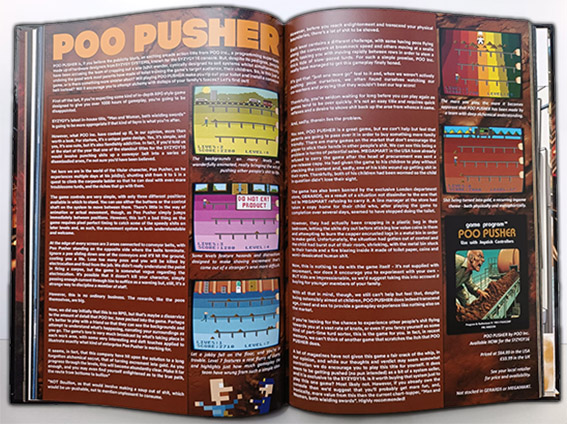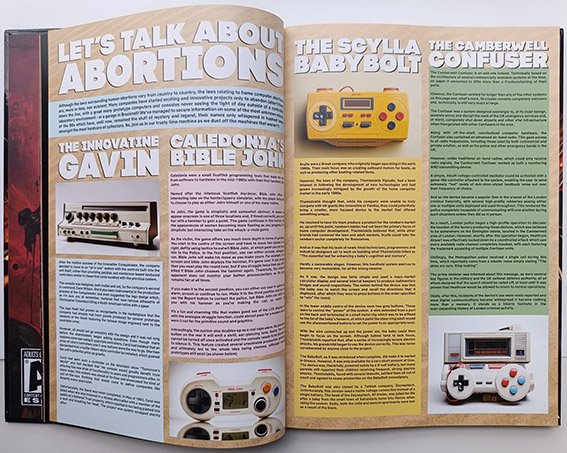
Everygamegoing
 6th September 2024
6th September 2024
George's Gaming Grimoire Volume 1
Retro gaming has had quite a few 'seasons' now, and some of us stalwarts have been around for all of them. There was the Fanzine Season, mostly pre-Internet, where numerous user groups kept older systems alive with photocopied A4 booklets. There was the Dead Season, when the Internet came along and people got all excited by its infinite possibilities, leaving only a handful of people making or playing retro games (and were looked upon with some disdain). There was the season of Resurgence, when we started seeing the Internet, and new, powerful computers being used to create new, brilliant, games - and when collecting the physical items became a hobby. Then there was the YouTube season, where "characters" began publishing YouTube videos touching on every aspect of retro gaming. And, it's at least arguable that some of these characters became quite well known in the scene, and a few of them indulged in behaviours that left a lot of others with considerably less money (Especially a certain Suzanne Martin and David Levy) and considerably higher blood pressure. It's only when we look back over the past twenty years that the end of one season and the beginning of another starts to become clear, and, as I write this, the YouTube season seems to be now winding down... And what will it be replaced with? The AI season? Who knows?

George Cropper, who is the author of George's Gaming Grimoire Volume 1, is one of the products of that afore mentioned YouTube season. He rose to prominence both as a supplier of Spectrum software (Bum Fun Software) and through his hard-hitting comedy persona George ("'Ello, it's George again"), whose YouTube videos frequently featured so much bad language it turned the very air blue around my laptop blue. George was one angry man, the targets of his ire being what he perceived as the grifters and conmen (and women) of the retro world, these "bastards' bastards' bastards' bastards" and his rants frequently had no video whatsoever - instead having JUST A FEW EMOTIVE WORDS IN COLOURFUL CAPITAL LETTERS DECRYING THE LATEST SCAM. It's fair to say George (the character) split opinion equally - some fans couldn't get enough of his diatribes, others found them offensive and bullying, and finally there were those of us who could agree with some of his points but not others.
So much for the background then. As George points out in his introduction, a couple of years ago, he got a bit tired of the scene, feeling that what was being offered up by YouTube creators wasn't actually adding anything meaningful. Rather like when I saw yet another gamer's "horrified reaction to Big Rigs" on my YouTube feed and started questioning my life choices. Thus, the end credits rolled on the Summer Of George, and, after a brief hiatus, he unveiled his idea for this new book: George's Gaming Grimoire, "a reality that never existed... and never will". His personal antidote to the chaos of the YouTube season - a book set in an alternate reality, about retro computers that never existed, people that never were, things that never happened and more toilet humour than Eighties' Ben Elton.

The book was funded on Kickstarter, and, to be absolutely honest, when I first saw it advertised there, I wasn't quite sure what to make of it. It certainly piqued my interest - but only in that sort of way that the glut of 'humorous' books that are published every Christmas do. I think toilet humour is something that a lot of people grow out of... I used to laugh at Ben Elton ranting and raving about bodily functions as a teenager, but re-watching those stand-up shows decades later, well, I really wondered why. A lot of books in the 'humour' section of WHSmith age badly for similar reasons. Everyone from The Mary Whitehouse Experience (Remember them?) through Armstrong And Miller to Mitchell And Webb has jumped on this particular bandwagon at some point, and the books never age especially well. But, ultimately, I did decide to back it - along with thousands of others. No doubt many of them fans of George, eager to see his return to the scene in literary format.
When the book arrived a year later, I had forgotten all about it. My first impression of it was that it was big. Flipping through it revealed hundreds of articles, two issues of a comic, letters pages, lavish advertisements and all manner of weird and wonderful artwork. This was no fanzine that you could read from cover to cover in ten minutes. This was something that someone had put serious work into. However, just reading the odd paragraph here and there, I was put in mind of the Viz comic - not, I hasten to add, due to the quality of illustrations or paper. Both of these are top-notch. But more due to the juvenile humour. Initially, I therefore found myself feeling like it might be a bit immature; I could imagine fourteen-year-old me devouring it, and insisting on showing some of it to bemused siblings and parents, and not comprehending why they just regarded me with a bewildered expression.

However, when I actually took the time to read it, I was pleasantly surprised. George's Gaming Grimoire is indeed very much like those books you might receive as a Christmas present - but it's specifically geared to those who are borderline obsessive retro computer collectors. Indeed, it's such a breath of fresh air that I devoured all it had to offer in a way that has never happened with previous Kickstarter books I have backed. For example, as a retro game fan, I frequently visited the Games That Weren't website, joined in with the hunt for Daffy Duck, marvelled at the old C64 games its administrators unearthed in the process - and backed the Games That Weren't book. But that book - arrgh, what a disappointment! A heavy, hardbacked regurgitation of what was on the website; page after page of dry text, and a cure for insomnia if ever there was one. George's book is at the other end of the scale - every page is bursting with colour, graphics and ridiculousness. This book certainly isn't going to send anyone to sleep.
In fact, it's difficult to even give a flavour of George's Gaming Grimoire without spoiling some of the fun. If you read it, you'll doubtless have your own highlights, but the interview that made me laugh out loud the most was the one with a (completely fictional) Japanese serial killer who chose to kill off his victims in an Eighties arcade hall. The juxtaposition of an interviewer enquiring into the subject's favourite retro games, and the subject's every answer somehow rounding back to the details of how the game was good because it indirectly added another body to the count is dark humour indeed but it's a good indication of the type of total nonsense that you'll find here. Indeed, the fictional interviewer is likely the only sane person in George's alternative reality - and after he's been despatched to grill so many pompous twats, he's probably also suffering some sort of breakdown now.

Something I genuinely loved about the book - and I mean really, really loved - was just how culturally appropriate it is. We are, as many retro gamers have already noticed, living in extremely interesting times: rapidly deteriorating mental health, misandry, cancel culture, Onlyfans, simps, Chads and Tyrones, a complete absence of comedy and the relationships between the genders never having been worse. But, for the most part, this whole wider world just falls away when reading reviews of the latest game, whether it's for the Spectrum or the PS5. And that's because we regard gaming as escapism - we don't want Pac-Man to lecture us on the evils of over-eating or trigger warnings that chasing ghosts could be seen as sexual harassment, we just want him to eat the dots and clear the maze. And yet, the wider world is having an impact, mostly silent, on the new games that are being produced. But it's not silent in George's Gaming Grimoire, that's for sure. If there's one thing that George has got a real bee in his bonnet about, it's how this all-pervasive, poisonous mentality has infected all of those who claim to be interested in gaming. And it's all handled with excellent satirical humour - the characters he's created are fictitious, yes, but they're close approximations of some of the YouTube season's more, let's say, 'flamboyant' grifters; those, for example, who've created Kickstarters and not delivered the goods, or those who have shilled for others without declaring their interest.
Something else that really appealed to me, as someone who consumed the paper-based magazines of the Eighties, was just how 'close' many of the articles about the fictitious retro computers are to articles that actually appeared in days gone by. Back in 1983, Your Computer carried a story about how a (self-proclaimed) ghost hunter used his 16K Spectrum to monitor things that go bump in the night. When you've goggled over 'real' news like this, it's not really a stretch to believe the Catholic Church just might have developed the Eucharist, a machine which would deliver electric shocks to those claiming to be possessed by a poltergeist. And we have very little information in our lived reality of what's going on in North Korea too, but from what we do know, it's really not hard to imagine that there might be Game And Watch style titles dedicated to the 'glorious leader' of that place. All of the photographs that generously illustrate these articles lend a real air of authenticity to them too. Such is the level of skill employed, there are times when you almost could almost believe they're true, were it not for the fact that the machines in question were always discontinued for some completely ludicrous reason. Mostly involving either death or shit... or both.
A large amount of the book is taken up with a Manga-style comic which has nothing to do with retro computers or gaming. It's an interesting read - a sort of Stephen King's Creepshow style story about a demon wreaking havoc in a Japanese school. It's enjoyable, but it feels like an odd inclusion, particularly as it's so big... I suppose it's in there to just deliver a bit of a break from the madness, perhaps in the same way as some of the old Eighties machines like Look-In (Remember that?) featured random comic strips among the pop star bios and advertisements. The art style is very lavish and the story, whilst nothing special, is gripping enough that you'll see it through to its conclusion.
Every few pages you'll find an advertisement for a new game for a fictitious machine, all of which are illustrated with screenshots that look completely genuine. The premise of each of them is completely stupid... but, again, no matter how ludicrous the idea, you get the feeling that some (probably Japanese) executive somewhere might well run with it in the future. A game about worms that invade the arseholes of Japanese schoolgirls? A variant of Donkey Kong where you smash the buildings by humping them to pieces with your giant gorilla male member (Donkey Schlong)? Oh yes, they're so very, very stupid, aren't they? So why do I get the distinct impression that homebrew coders who get ahold of this book will be scrambling to bring some of these bizarre ideas to life?
Now in case I haven't laboured the point enough yet, this book is brilliantly original, which is exactly what its author intended. Everyone should get a copy of it - it's priceless. You should get a copy of it even if you were not a fan of the George YouTube channel, because it's just the tonic the community needs at the moment. It's satire. It's laugh-out-loud funny in places and, even though it's got a warning on the front cover saying "Not for the easily offended", the only people who would find this offensive would be those YouTubers who see themselves in the characters George has created.

Which leads me nicely into what I feel is the only criticism of George's Gaming Grimoire that I have. The fictional interview subjects in the book are grilled by Mr. Peter Lee, whose questioning is almost entirely conversational. In many cases, it's not long before they (the subjects) start revealing their stupidity, and one of Mr. Lee's favourite gotchas is to correct their grammar. The problem is, he himself betrays his own lack of schooling in this area by also getting it wrong. There is a proper way to use "you and I" (that being when both are the subject of a sentence), and it's wrong to use it when both are the object of a sentence. If both are the object of a sentence, it is correct to use "you and me". I don't think this is intentional at all because Mr. Lee is a hard-hitting and straight-down-the-middle type of fictional character. He's there to expose the scurrilous behaviour of these other fictional characters. Now I'm sure that, by now, you've started wondering precisely why I'm honing in on a few lines of text between two fictional characters in this much detail. Well, I will explain...
There may be occasions where it is necessary orally to correct someone's grammar. For example, if you're training someone to deliver advocacy before a judge or if you're talking with a native speaker and their use of grammar suggests something different from what they intended to say. But I have never experienced an interviewer correcting his subject in this sort of way - it comes across as very patronising and seems completely out-of-place in the exchanges themselves.
Out-of-place, that is, until you remember that this is George writing this - the man whose YouTube rants would regularly indulge in such hyperbole that his original points would get lost in the diatribe. I remember well one of George's videos on Sir Clive Sinclair's role in the ZX Vega Plus disaster which started with a muse on how much Sir Clive knew about the project itself, before deteriorating into a strange fantasy of urine, champagne and chorus girls. George clearly has a very unique brain. When most people are upset, they keep their criticism to the point at hand - if they've experienced poor customer service, they complain about that lack of customer service. George is different - if he makes up his mind that someone has behaved improperly, he not only lambasts their performance but also fantasies about a variety of other crimes that that person may be guilty of. It's one of the reasons his YouTube videos constantly split opinion, why most people agreed with them up to a point but not further.

What I see, in these short corrections - and is truly remarkable! - is George actually straining at the leash, wanting to go "full George" on his own fictional creations! I can almost hear his raspy voice ranting: "Can't you even get speak English properly, you stupid bastard?!" Which is rather ironic when he's also got it wrong himself. Some of the book's YouTubers also discuss how they used "Prickstarter" to fund their own projects, and this is presented as something that, to further your career in the retro gaming community, is as par for the course as getting naked on Twitch or Onlyfans. Well, when you've used Kickstarter to fund your own book, there's an element of cognitive dissonance at play in that sort of satire. I mean, George is a character himself, all of his YouTube videos began the same way: "'Ello, it's George again" and ended abruptly the same way: "Okay, bye." Peter Lee could just as well be interviewing a fictional version of him, if you think about it.
In conclusion then, what we have in this book is a real oddity. The production values are through the roof, the writing is top-notch and flicking through it is like finding another sketch to enjoy in a comedy sketch show. The humour is a bit hit and miss, but only in the sense that the pages that really made me laugh out loud may well not be the ones that will make you laugh out loud. It's a book for men rather than women, and the more heavily you are invested in the retro gaming world, the more you'll find its alternate reality both thought-provoking and delightful. You'll have noticed that, during this review, I haven't mentioned a lot of specifics of the articles themselves and this is entirely intentional. This is a book that you want to come to fresh, not have the best bits revealed to you in advance.
Also, and very importantly, this book achieves what it sets out to do. You won't read this book once and then forget about it. Indeed, you might even be coming back to it in ten years as a fascinating period piece, particularly as we now seem to be entering an age where AI will start writing retro games for us and they'll be no need for independent journalism, or YouTube characters, at all. It's the best humorous book about retro gaming I've ever read. I don't think anything else can touch it.
Scores
Generic Version| Overall | 97% |


